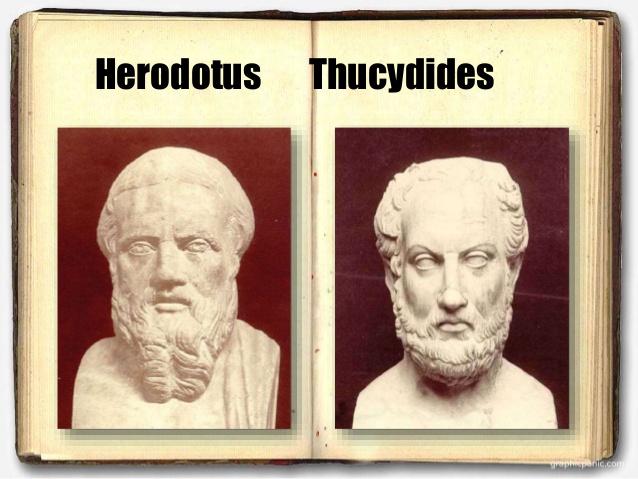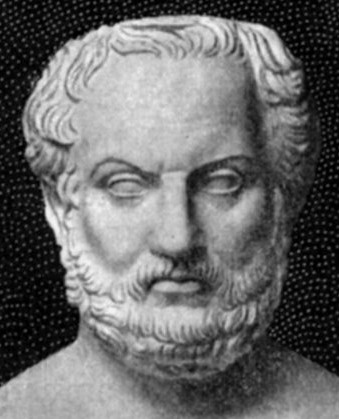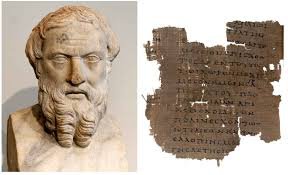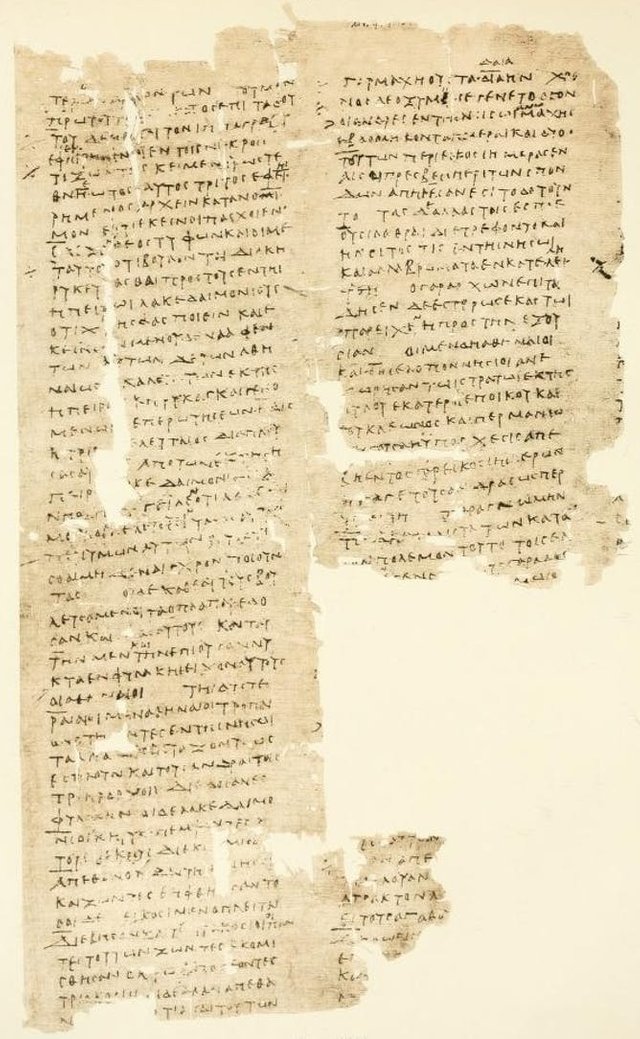5th C. Historians of Greece (Herodotus & Thucydides)

Herodotus ‘The Father of History’
The advance from such beginnings to the creation of history was the achievement of Herodotus, the first Greek prose writer whose work we have today. Born at Halicarnassus early in the 5th century, Herodotus later lived at Athens and joined the Athenian colony of Thurii in southern Italy; but much of his life was spent in travelling still more widely over the Greek and non-Greek world. Many of the five hundred pages of his book present (along with material drawn from earlier writings) the harvest of information which he gathered on his travels: one long section takes us to Egypt, others to Thrace, Scythia, North Africa, India and Babylon.
What distinguishes Herodotus from his predecessors is the inclusion of all this within a single historical framework—the Narrative of the struggle between Greece and Persia, which is stated as the book’s subject in its opening sentence, provides a connecting chain through two-thirds of its length and culminates in a narrative of Persian aggression and its defeat that sweeps majestically forward almost without a break. Whether this historical pattern was in the author’s mind from the first, or a structure superimposed later, is a much-disputed question. The result, however it came about, is a work of epic dimensions, embodying a magnificently broad conception of history. Yet for all his breadth of view Herodotus is never abstract: he is always concerned with particular places and events, particular customs and beliefs; above all, his pages are a portrait gallery of famous men and women, although the hero of his narrative as a whole is Athens itself.
Herodotus has a childlike love of marvels—Indian ants bigger than foxes, the gruesome burial ceremonies of Scythian kings— and he describes them in a story-telling style so apparently simple that its art passes unnoticed. He is too easily regarded as a mere narrator of wonders. In reality his outlook is the insatiable questioning spirit of historsé, seeking truth and repeatedly giving voice to doubt. Of the diver who was said to have escaped from the Persians by staying beneath the surface of the sea for nearly ten miles, he writes:
How he did reach the Greeks I cannot say with certainty, but I should be surprised if the story told is true... My own opinion is that he came to Artemisium in a boat. (The Histories Book 8.9)
The ‘father of history’, as he is rightly called, is no credulous fool. He is often skeptical, but he is not systematic in his treatment of evidence: history for him is certainly an art, not a science. For a more scientific approach and for the first statement of principles acceptable to a modern historian, we have to turn to his younger contemporary, Thucydides.
Thucydides 'The First Scientific Historian'
Athenian born and bred, Thucydides had reached the position of general by 424 BC, when he was held responsible for a defeat and exiled. For twenty years, until he returned to Athens shortly before his death, circumstances placed him, like Herodotus, in the position of an observer. His choice was to concentrate his attention on contemporary history: his work begins with a survey of the past, but only to demonstrate ‘the feebleness of antiquity’ and the unprecedented size and importance of the struggle between Athens and Sparta. The rest, with few digressions, describes the course of the Peloponnesian War down to 411, where it breaks off, unfinished and unrevised.
How far the book was constructed on a single plan, we do not know; but it bears all the marks of a rational and systematic approach to the writing of history. In contrast with Herodotus’ breadth of view, Thucydides restricts his theme to the military events of the war and the reasons for them. He adopts a simple summer-winter division of each year to avoid chronological confusion. He handles evidence in accordance with rules comparable with the precision of medical science at the time:
With regard to my factual reporting of the events of the war I have made it a principle not to write down the first story that came my way, and not even to be guided by my own general impressions; either I was present myself at the events which I have described or else I heard of them from eye-witnesses, whose reports I have checked with as much thoroughness as possible. (The Persian Wars 2 1.1.1)
The work of Herodotus, like Homeric epic, included speeches by leading characters in the narrative: this practice Thucydides also systematized and adapted to his own ends, putting into the mouths of the speakers the motives which prompted an action, the arguments for and against it, the policies and principles involved.
Thucydides’ book, however, is more than systematic or even scientific history. It has other qualities which make it great literature. His swift narrative has a unique and paradoxical style: It breathes the spirit of contemporary rationalism yet has an old-fashioned flavour; it is concise and austere, yet forceful and impassioned. The style is typical of the man. By no means impartial, he is deeply committed to support of Pericles and his policy, deeply moved by Athens’ folly (as he sees it) and its disastrous results; yet he austerely surveys the whole story as a clinical example of human behaviour under the stresses of imperialism and war. In Thucydides’ account of the tragedy of Athens there is a grandeur of conception, as well as an intensity of feeling, which would have stood out even more clearly, if he had been able to continue the story to the end.

Thucydides had no successor. The 4th century, of prose, was not lacking in historians, but produced none comparable with the giants of the 5th.
Also see my previous post on Thucydides' Melian Dialogue;

